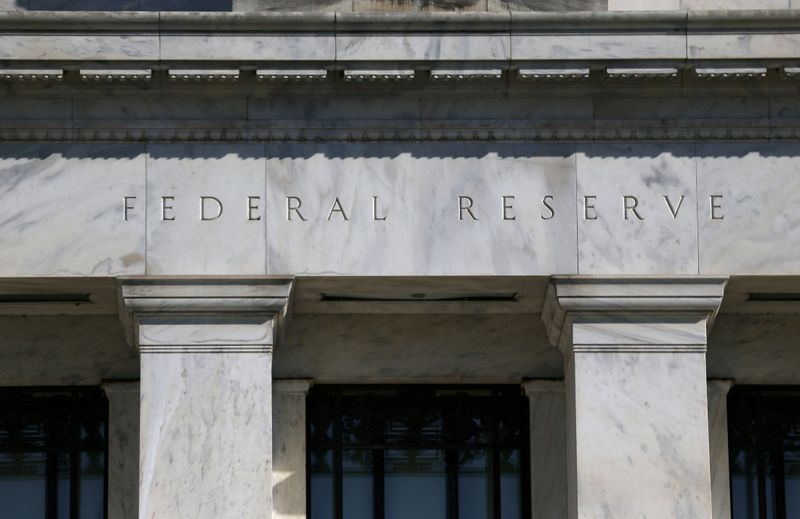NEW YORK (Reuters) – U.S. corporate debt has already rebounded on the back of the Federal Reserve’s unprecedented support for the market, but investors like PIMCO still see value in some top-shelf names, saying the risk of default is lower than current prices indicate.
The Fed on March 23 announced it would for the first time purchase corporate bonds, backstop direct loans to companies and extend credit to small businesses. On Thursday, it said it would expand its bond-buying to include companies recently downgraded into junk territory as well as junk bond exchange-traded funds (ETFs).
Credit spreads, which on March 23 were the widest since the financial crisis, have narrowed considerably. The spread, using the ICE/BofA investment-grade corporate index <.MERC0A0> has narrowed by 155 basis points while the high-yield index <.MERH0A0> has narrowed by 317 basis points. Spreads – referring to the difference between the yield on corporate credit over safer Treasuries – typically widen when the perceived risk of default rises.
“If you look at the level of implied default in the investment-grade corporate bond market, even at today’s valuations, the spreads are way too wide given what we think will be actual defaults,” said Mark Kiesel, chief investment officer for global credit at Pacific Investment Management Company (PIMCO).
The Newport Beach, California-based investment manager is among the largest in the world with $1.91 trillion assets under management as of Dec. 31 2019.
Prior to the March 23 intervention, corporate bond valuations implied a default rate of 25% cumulatively over five years, said Kiesel. By comparison, he said, 2.9% was the maximum cumulative five-year default rate recorded previously in default studies conducted by Moody’s Investors Service.
Companies have also taken advantage of the improved sentiment around credit to issue new debt, with five issuers announcing deals on Monday according to Refinitiv IFR. That included issuers in hard-hit sectors like energy and retail, including Burlington Coat Factory [BCF.UL] and Ferrellgas Partners <FGPR.PK>.
Another four issuers announced deals on Tuesday, to raise $5.65 billion in total, including a $1.2 billion junk-rated deal from airplane parts manufacturer Spirit Aerosystems <SPR.N>. Though the industry is currently suffering because of reduced air travel, the parts maker saw enough demand for its issue that it increased the size of its offering and weakened investor protections.
Analysts at Bank of America listed in a research note on Tuesday “four reasons to favor credit over equity”, noting it recovers faster, spreads are currently wide, there are fewer downgrades to “fallen angel” status expected and there is powerful Fed support.
While investment-grade issuers, and companies recently downgraded into junk territory, will benefit the most from the Fed program, lower-tier junk bonds have also seen prices rally.
“High-yield investors are coming in to buy even companies that are not eligible and it’s just a function of value,” said Kiesel. “Some people see the prices as so low that there’s value in the marketplace even for credits that aren’t directly covered from the facilities.”
High-yield exchange-traded funds have risen, like the iShares iBoxx High Yield Corporate Bond Fund <HYG.P> which is up 5.5% since market close on Wednesday, before the Fed’s announcement.
Short-interest data firm S3 said on Tuesday that over the past week there had been short selling in both high-yield and investment-grade corporate bond ETFs, but anticipated that there would be short covering “as prices surge when individuals and institutions trade alongside the wave of the Fed’s $40 billion of potential buy orders.”
PIMCO is prepared to take advantage of the opportunities in the junk-rated market, said Kiesel, but in the short term remains positioned defensively.
“We’re quite cautious on the recovery, which is why we’re favoring the highest tiers of investment grade,” said Kiesel.
“At the same time, over the next one-two years we do think that the economy will come back … And so yes, we are going to be gearing up in that space, because we do think a lot of interesting situations will come up.”
PIMCO is looking to raise at least $3 billion for a distressed debt fund, a source familiar with the situation said, confirming a Bloomberg report from last week. The source said plans for the fund had been in the works before the coronavirus outbreak.
PIMCO spokesman Michael Reid declined to comment.
(Reporting by Kate Duguid; additional reporting and editing by Megan Davies; Editing by Chizu Nomiyama and Tom Brown)



















